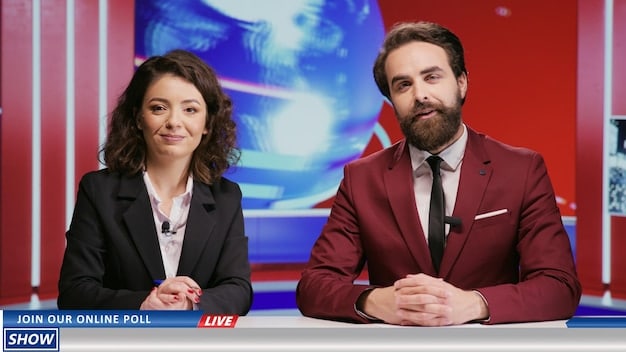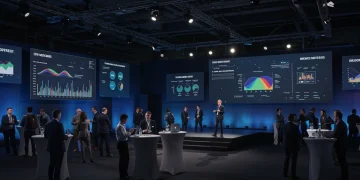Confirmed: 2025 Presidential Debate Format Changes Announced

The Commission on Presidential Debates has officially announced format alterations for the 2025 debates, focusing on enhanced moderation and audience engagement to foster more substantive discussions and reduce interruptions.
The Commission on Presidential Debates has officially confirmed changes to the format of the 2025 presidential debates. These alterations aim to address concerns raised during previous election cycles regarding interruptions, audience behavior, and the overall quality of the discourse. With the 2024 election behind us, all eyes are looking forward to the next presidential campaign and how these new formats will shape the way candidates present their platforms. Understanding these changes is crucial for voters and political observers alike. The confirmed: presidential debate format changes announced by Commission on Presidential Debates for 2025 promise a more structured and engaging series of debates.
Understanding the Rationale Behind the Debate Format Changes
The decision to overhaul the debate format didn’t come out of thin air. It was influenced by feedback from viewers, debate moderators, and political analysts who felt that prior debates didn’t always serve their intended purpose. Changes were sought to reduce the potential for chaos and to prompt candidates to focus more on policy and less on personal attacks.
The goal is to cultivate a forum where candidates can articulate their vision for the country, address critical issues, and engage in informed dialogue. By minimizing distractions and enforcing rules, the Commission on Presidential Debates hopes to enhance the value of these televised events for the electorate.
Key Issues Addressed by the Changes
Several specific issues led to the demand for revisions. One primary concern was the frequency of interruptions, which often made it difficult for either candidate to fully express their thoughts or for viewers to follow the arguments being made.
Another concern revolved around the behavior of live audiences, which sometimes influenced the tone and tenor of the debates in ways that were considered unproductive. Finally, there was a desire to focus more on substantive policy discussions and less on personal attacks or sound bites.
- Reduced interruption times
- Stricter enforcement of time limits
- Changes to audience participation
- Increased focus on policy questions
Therefore, the Commission’s rationale in changing the format has focused upon creating a fair and structured environment by reducing interruptions, audience distractions, and personal attacks so candidates respond to important issues.

Specific Changes to the Debate Format
The newly confirmed changes involve several specific adjustments to the structure, moderation, and audience interaction during the debates. These tweaks are intended to address previously identified issues and facilitate a more productive exchange between candidates.
Some of the alterations are subtle, while others represent more significant departures from past practices. Together, they are intended to create a more level playing field and ensure that the debates serve their intended purpose of helping voters make informed decisions.
Moderation Style
One of the most notable changes involves the role of the moderator. In previous debates, some moderators were criticized for either being too passive or too intrusive. The new format seeks to strike a better balance, with moderators taking a more active role in guiding the discussion and enforcing the rules.
Expect moderators to interject more frequently to keep candidates on track, prevent interruptions, and ensure that questions are answered directly. The goal is to maintain order and foster a more substantive exchange of ideas.
Changes to Audience Interaction
Another significant change relates to the presence and behavior of the live audience. In the past, audiences sometimes played a disruptive role, with cheers, jeers, and other outbursts. The new format seeks to minimize these distractions by limiting audience participation.
- Smaller, more controlled audiences
- Stricter rules against disruptive behavior
- Potentially, the inclusion of pre-recorded questions
- Reduced opportunities for candidates to play to the crowd
Limiting the amount of audience participation and implementing more strict rules intend to have debate participants focus on their statements rather than on gaining applause from the crowd.

The Anticipated Impact on Candidate Performance
The changes to the debate format are anticipated to have a significant impact on how candidates perform and how their messages are received by viewers. Candidates who excel at quick comebacks and crowd-pleasing rhetoric may find themselves at a disadvantage. The format may favor those who are better prepared to engage in thoughtful discussion.
Ultimately, the success of candidates in the upcoming debates may depend more on their ability to articulate clear, well-reasoned arguments and less on their talent for scoring quick political points.
How Candidates Might Adapt
In anticipation of the new debate format, candidates are likely to adjust their preparation strategies. They may devote more time to studying policy details and crafting nuanced arguments.
Candidates may also seek guidance from debate coaches on how to effectively communicate in a more structured and controlled environment. The ability to listen attentively, respond thoughtfully, and avoid getting drawn into unproductive exchanges will likely be paramount.
Candidates will need to refine their strategies to be successful within the parameters that include:
- More substance over style
- Deeper knowledge of policy
- Listening to respond rather than react
- Being able to adjust to change
In summary, the newly confirmed presidential debate format changes by the Commission on Presidential Debates have the potential to influence how candidates perform on stage.
Potential Benefits of the New Format
The new debate format is expected to yield numerous benefits, both for the candidates and for the viewing public. By promoting more substantive discussions and reducing distractions, the new format may help voters make more informed decisions.
The revised format may contribute to the overall quality of political discourse in the United States. If candidates are encouraged to engage in thoughtful dialogue and address complex issues, it could elevate the tone and substance of political debates across the board.
Increased Focus on Policy
One of the primary goals of the new format is to increase the focus on policy issues. By limiting interruptions and encouraging candidates to answer questions directly, the Commission hopes to steer the debates toward a more in-depth exploration of the challenges facing the country.
Expect moderators to ask more specific questions about candidates’ policy proposals and to press them to defend their positions with evidence and reasoned arguments. The hope is to move beyond sound bites and talking points and get candidates to engage with the substance of the issues.
The changes intend for debates to present important policy making components that include:
- In depth policy answers
- Clear and direct responses
- More transparency
- Candidate to candidate policy discussion
So, the audience will have in depth policy answers and have candidate responses clearly and directly with greater transparency.
Criticisms and Concerns About the Changes
While the new debate format has been met with generally positive reactions, it has also drawn some criticisms and raised concerns. Some observers worry that the changes may stifle spontaneity or unduly restrict candidates’ ability to express themselves.
There are also questions about how effectively the new rules will be enforced and whether moderators will be able to maintain control without appearing biased or heavy-handed. It is important to examine these concerns and consider whether the potential benefits of the new format outweigh the risks.
Risk of Over-Moderation
One concern is that the increased role of the moderator could lead to over-moderation, with moderators becoming too intrusive or controlling. If moderators are too quick to interrupt or cut off candidates, it could stifle the flow of the debate and prevent candidates from fully developing their arguments.
It will be important for moderators to strike a balance between maintaining order and allowing candidates sufficient leeway to express their views. The goal should be to facilitate a productive exchange of ideas, not to impose a rigid or artificial structure on the debate.
Challenges for Candidates
Another concern is how to best manage new rules and regulations that candidates must adhere to while:
- Presenting themselves in a positive light
- Showcasing their strengths
- Not being too aggressive, but showing conviction
- Making their policies clear, concise, and memorable
Therefore, candidates must learn to adapt while on stage making what could be a challenging environment of new modifications for all involved.
Looking Ahead: Expectations for the 2025 Debates
As the 2025 presidential debates draw closer, anticipation is building about how the new format will play out in practice and how viewers will respond. The debates promise to be a pivotal moment in the election cycle, offering voters a crucial opportunity to assess the candidates and their platforms.
Whether the changes lead to higher-quality discussions and a more informed electorate remains to be seen, but there’s no doubt that the stakes are high. The nation will be watching closely to see how the candidates perform and whether the debates live up to their potential as a forum for meaningful dialogue and democratic engagement.
The Role of Media Coverage
In the lead-up to the 2025 debates, media coverage will play a crucial role in shaping public perceptions of the candidates and the issues at stake. News organizations, political commentators, and social media influencers will all weigh in with their analyses and opinions.
It will be important for voters to consume media coverage critically and to seek out diverse perspectives. By doing so, they can form their own judgments about the candidates and their policies and make informed decisions at the ballot box.
So, viewers should be ready to prepare and:
- Do their due diligence
- Not rely solely on media coverage
- Seek diverse perspectives
- Utilize available resources for guidance
With the ever-changing media influence, it is imperative that viewers are savvy consumers of information to be ready to act on their own accord.
| Key Point | Brief Description |
|---|---|
| Moderation Style | More active moderators guide discussions and enforce rules. |
| Audience Interaction | Smaller audiences with stricter rules against disruptive behavior. |
| Policy | Increased focus on policy questions and in-depth exploration |
| Candidate Performance | Candidates refine strategies to present policies concisely. |
Frequently Asked Questions
▼
Changes were implemented to address disturbances and the chaotic nature of previous debates by encouraging candidates to focus on substantive policy discussions rather than personal attacks.
▼
Moderators will take a more active role in guiding discussions, enforcing time limits and actively preventing candidate interruptions to maintain order and a serious discussion.
▼
Candidates are expected to focus more on policy analysis and thorough preparation, adapting to a more controlled and organized environment which will affect the presentation and discussion of strategies.
▼
The new format has the intent to provide higher quality discussions and a more informed electorate by encouraging candidates to take part in detailed dialogue and focus on policy issues.
▼
Some observers worry that changes may limit spontaneity restricting candidates’ expression. Concerns also increase whether the moderators can enforce rules without being biased or forceful in the dialogue.
Conclusion
In conclusion, the confirmed presidential debate format changes announced by the Commission on Presidential Debates for 2025 represent a significant effort to improve the quality and substance of televised debates. These changes, focusing on moderation, audience interaction, and policy, aim to foster a more informed electorate and elevate political discussions. As the 2025 debates approach, the effectiveness of these reforms will be closely watched, with anticipation and cautious optimism about their potential impact on candidate performance and public discourse.





